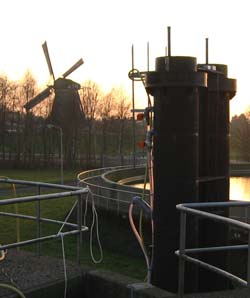Delft water-purification method promises radical improvement

A test reactor for the new aerobic granular sludge technology (Nereda TM).
With the new aerobic granular sludge technology (Nereda TM), aerobic (thus oxygen using) bacterial granules are formed in the water that is to be purified. The great advantage of these granules is that they sink quickly and that all the required biological purifying processes occur within these granules.
The technology therefore offers important advantages when compared to conventional water purification processes. For example, all the processes can occur in one reactor. Moreover, there is no need to use large re-sinking tanks, such as those used for conventional purification. Such large tanks are needed for this because the bacteria clusters that are formed take much longer to sink than the aerobic granule sludge.
According to Delft PhD researcher Merle de Kreuk, a Nereda TM purification installation needs only a quarter of the space required by conventional installations. Moreover, Nereda TM uses 30% less energy than the normal purification process. This Nereda TM purification process is suitable for both domestic and industrial waste water.
Delft University of Technology has a long tradition in researching the possibilities of water purification with aerobic granular sludge. The maturation of the technology is largely due to the research conducted by De Kreuk. During her PhD research with Prof. Mark van Loosdrecht, De Kreuk – working together with DHV engineering bureau and supported by STOWA and STW grants – solved various technological bottlenecks and expanded the capacity of the test installation from 3 litres per hour to 1,500 litres per hour. DHV now has the final design, which is ready for practical implementation.
The aerobic granular sludge technology is very promising, and has been nominated for the Dutch Process Innovation Award 2006. The technology is now in the commercialisation phase. In the coming years, De Kreuk will continue to contribute to the project's trajectory as a Delft researcher. DHV is currently negotiating with water purification companies to test this purification method on a larger scale. The first installations are already in use in the industrial sector.
Media Contact
More Information:
http://www.tudelft.nlAll latest news from the category: Process Engineering
This special field revolves around processes for modifying material properties (milling, cooling), composition (filtration, distillation) and type (oxidation, hydration).
Valuable information is available on a broad range of technologies including material separation, laser processes, measuring techniques and robot engineering in addition to testing methods and coating and materials analysis processes.
Newest articles

Properties of new materials for microchips
… can now be measured well. Reseachers of Delft University of Technology demonstrated measuring performance properties of ultrathin silicon membranes. Making ever smaller and more powerful chips requires new ultrathin…

Floating solar’s potential
… to support sustainable development by addressing climate, water, and energy goals holistically. A new study published this week in Nature Energy raises the potential for floating solar photovoltaics (FPV)…

Skyrmions move at record speeds
… a step towards the computing of the future. An international research team led by scientists from the CNRS1 has discovered that the magnetic nanobubbles2 known as skyrmions can be…





















